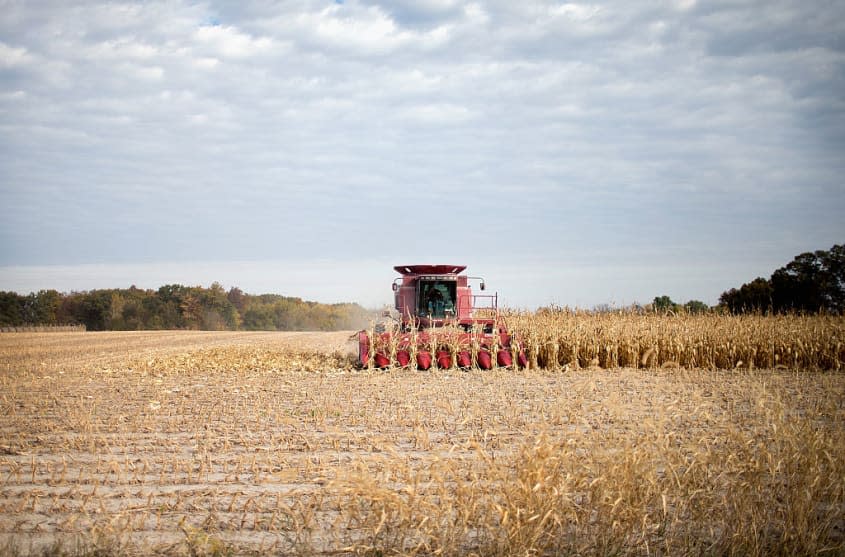Why America might ban Chinese ownership of U.S. farmland

Is China buying up U.S. farmland? And is that a threat to America's food supply? The issue has become a "flashpoint" in relations between the two countries, The Wall Street Journal reports. In Congress and in a growing number of U.S. states, there is a movement to ban foreign ownership of agricultural land so that "the U.S. food-supply chain is protected and that China and other foreign adversaries aren't able to use U.S. land as a perch for spying." But some critics suggest that such efforts are the result of anti-Asian sentiment that has been festering in the United States in recent years. "This is the same sentiment that had people putting up signs saying 'Irish Need Not Apply,'" said one Texas lawmaker. How much American land is owned by Chinese entities? And are bans on the way? Here's everything you need to know:
Are Chinese owners actually buying U.S. farmland?
If they do, it's not that much. Agriculture.com reports on federal data that shows that Chinese owners control just 0.5 percent of all U.S. farmland — and just less than 1 percent of "foreign-held acres" overall. (Overall, foreigners own roughly 3 percent of American agricultural land, with Canadians comprising the largest landholders.) But Politico noted in 2021 that Chinese corporations have spent the last decade buying American agribusiness companies — like the pork producer Smithfield Foods — and that by the start of this decade, owned roughly 192,000 acres of farmland. And the Center for Strategic & International Studies notes that foreign ownership of American farmland doubled between 2009 and 2019. (The U.S. has about 900 million acres of farmland overall.) Even those who raise concerns about Chinese ownership of such land, like U.S. Rep. Ralph Norman (R-S.C.) acknowledge "it's not a huge percentage of our total farm acreage by any stretch."
So why the concern?
It's not just about the food supply. CNBC reports about concerns that arose in 2022 when a Chinese company, Fufeng Group, bought 300 acres of land near Grand Forks, N.D. to set up a corn milling plant. Why the concern? The property is about 20 minutes away from Grand Forks Air Force Base, "home to some of the nation's most sensitive military drone technology." Concern about that was bipartisan: "We should be seriously concerned about Chinese investment in locations close to sensitive sites, such as military bases around the U.S," said Sen Mark Warner (D-Va.) In January 2023, officials in Grand Forks said they would deny permits for the project.
But it is a food supply issue too, right?
Sort of. Critics of Chinese ownership do often invoke the safety of America's food supply when arguing for a ban. Those fears might be a bit overblown: CSIS says foreign acquisitions of U.S. farmland "do not represent a substantial enough portion of food production in the United States to threaten national food security." The pandemic played a role in increasing concern, though. "Smithfield increased pork exports to China even as the United States experienced widespread meat shortages due to supply chain disruptions."
So who is talking about banning Chinese ownership?
At the federal level, Reps. Cathy McMorris Rodgers and Dan Newhouse — both Washington Republicans — have introduced a bill to "prohibit the purchase of public or private agricultural land in the United States by foreign nationals associated with the Government of the People's Republic of China." Across Capitol Hill, Sens. Jon Tester (D-Mont.) Mike Rounds (R-S.D.) are sponsoring their own legislation "aimed at preventing China, Russia, Iran and North Korea from investing in, purchasing, leasing or otherwise acquiring U.S. farmland." And Donald Trump, once again running for president, has vowed to "ban Chinese nationals from buying US farmland or owning telecommunications, energy, technology, and medical supplies companies," the New York Post reports.
States are also getting in on the action. California lawmakers in 2022 passed a similar bill that was later vetoed by Gov. Gavin Newsom — they're reintroducing it this year, Politico reports. But other, mostly GOP-led agricultural states have legislation on the table, including Texas, Montana, and Kansas. The National Agricultural Law Center adds that overall, 22 states are considering such bills.
What's the argument against banning Chinese ownership?
Roughly 40 percent of American farmland will change hands over the next two decades, part of a generational handoff from older farmers to younger. "Ensuring that those acres are transferred in a way that protects national and food security should be a priority," Adam Minter writes at Bloomberg Opinion. But that can be done without barring foreign ownership, he writes. Better solutions include "demanding more transparency about foreign land acquisitions." Indeed, legislation to require "real time" disclosures of land purchases by foreign nationals has been introduced by Sens. Tammy Baldwin, (D-Wisc.) and Chuck Grassley (R-Iowa.). But Minter argues that an outright ban "codifying prohibitions on Chinese nationals at a time when Asian-Americans already face discrimination would likely inflame an already difficult situation."
What are Chinese officials saying about all this?
Not much. The Wall Street Journal says the Chinese embassy didn't respond to its inquiries about the topic, but notes that in the past the government has said "that it encourages Chinese companies to invest overseas in accordance with local laws." As tension rises between the U.S. and China, the debate over U.S. farmland will probably become more prominent.
You may also like
7 cartoons about gun violence in America
The U.S. economy is shifting toward disinflation. Here's why that's 'most welcome.'
United States shoots down Chinese spy balloon over Atlantic Ocean

 Yahoo Movies
Yahoo Movies 
